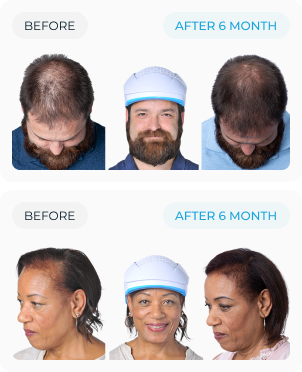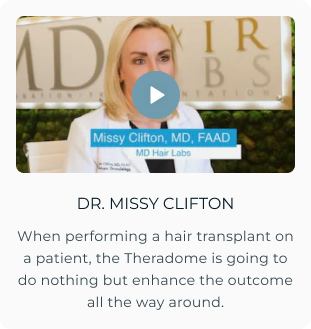Many pregnant women enjoy having thick, luxurious hair that looks full of life and shine. It can seem like the "pregnancy glow" extends to getting your best hair days during those nine months. However, some women are surprised to experience excessive hair loss during pregnancy. While it's normal to lose some hair every day, noticing large amounts falling out can be alarming and confusing when you're expecting.
Pregnancy hair loss is quite common at some point before giving birth. Several different factors can disrupt your hair's normal cycle and lead to excess shedding. From hormonal changes to nutritional deficiencies, understanding the causes can help prevent excessive hair loss. In this post, we'll explore six main reasons why your hair starts to thin or fall while pregnant.
Is Hair Loss Normal During Pregnancy?
Yes, hair loss during pregnancy is quite common. Many women experience noticeable hair loss more than usual, especially in the months after giving birth. The reason for this is the changes happening in your body.
During pregnancy, your hair goes through a resting phase where fewer hairs are shed. This is why your hair may seem thicker and fuller. But after you have the baby, your hair returns to its normal growth cycle, causing more hairs to fall out at once. This can make it look like you're losing a lot of hair, but it's just your hair returning to its regular pattern.
6 Causes of Hair Loss During Pregnancy
Hair loss is a relatively common concern among pregnant women, and it can be attributed to a combination of genetic and psychological factors. While many women, due to increased hormone levels, experience thicker and healthier hair during pregnancy, some may notice hair thinning or shedding. This condition is also known as "telogen effluvium." Here are some causes of pregnancy hair loss:
1. Hormonal Changes
Fluctuations in hormones are pretty normal during pregnancy since the body produces higher levels of estrogen and progesterone. In many cases, these pregnancy hormones promote hair growth and lead to thicker, healthier hair. However, after childbirth, the hormone levels drop significantly, which can shift a larger number of hair follicles into the resting (telogen) phase. This hormone change can result in hair shedding several weeks to a few months postpartum.
2. Telogen Effluvium
It is a temporary form of hair loss that is triggered by significant physiological changes such as childbirth. It is a natural part of the hair growth cycle. During and after pregnancy, the shift in hormone levels can disrupt the normal hair growth cycle, causing more hair follicles to enter the shedding phase than usual. This kind of hair shedding typically occurs a few months after giving birth and can last for a few months.
3. Nutritional Factors
During pregnancy, both the mother and the developing fetus require increased nutritional intake. If there is a lack of essential nutrients in a mother’s diet, then it could impact hair health. E.g., insufficient intake of vitamins and minerals like iron, zinc, and biotin could contribute to hair thinning and hair loss.
4. Stress and Fatigue
Pregnancy and childbirth can be demanding both physically and mentally. It also leads to stress and fatigue, and because of high-stress levels, the hair growth cycle gets affected, potentially triggering hair loss.
5. Genetic Predisposition
Family history plays a role in determining hair health and potential hair loss during pregnancy. Hormonal changes related to pregnancy also can exacerbate the condition if a woman has a genetic predisposition to hair thinning or androgenetic alopecia.
6. Postpartum Thyroiditis
Some women also experience postpartum thyroiditis, a temporary thyroid gland inflammation that occurs within the first year after childbirth. Thyroid imbalances can contribute to postpartum hair loss.
Can Hair Loss be Related to Other Reproductive Health Issues?
Yes, hair loss can be related to other reproductive health issues as well. Hormonal imbalances and changes in the body can affect the hair growth cycle. Here are some reproductive health conditions that can contribute to hair loss:
Polycystic Ovary Syndrome (PCOS): PCOS is a common hormonal disorder that affects women of reproductive age. It is characterized by irregular periods, ovarian cysts, and higher levels of androgens (male hormones) such as testosterone.
Menopause: Menopause is a natural stage in every woman’s life when menstrual periods cease. The changes in hormones that occur during menopause can impact hair health, leading to thinning and hair loss in some women.
Hormonal Birth Control: Certain hormonal contraceptives such as birth control pills, patches, or injections can influence hormone levels, potentially leading to hair changes as well as hair loss. However, it is not a common side effect for most women.
Anemia: During heavy menstrual periods or other factors, iron deficiency anemia can affect the health of the hair and lead to hair loss.
Treatment for pregnancy hair loss
Hair loss during pregnancy is a natural phenomenon caused by hormonal changes, not permanent hair loss. The hair growth cycle will usually return to normal after childbirth. But sometimes, some women experience hair loss significantly. Here are some steps you can take to treat it:
Maintain a Healthy Diet: Eating a good diet is important when you are pregnant and experiencing hair fall. Ensure that you are getting a balanced and nutritious diet that is rich in vitamins, proteins, and minerals. Also, ensure adequate intake of nutrients like iron, zinc, biotin, and vitamins A and D, which promote healthy hair growth.
Stay Hydrated: Drink plenty of water to hydrate your body as well as your hair.
Manage Your Stress: Try to manage your stress levels by practicing stress-reducing techniques such as deep breathing, meditation, yoga, or engaging in hobbies you enjoy. High stress levels exacerbate hair shedding.
Gentle Hair Care: Avoid additional stress on your hair follicles using a mild, sulfate-free shampoo. Also, avoid excessive heat styling, tight hairstyles, and harsh hair treatments.
Avoid Tight Hairstyles: Wearing your hair pulled back tightly can cause you to lose more hair while pregnant. Avoid tight hairstyles like braids, ponytails, or buns, which can stress hair follicles and contribute to hair loss.
Consider Supplements: Taking supplements that promote hair health, such as biotin, collagen, or prenatal vitamins, may benefit some women.
Time and Patience: Hair loss during pregnancy is temporary and resolves on its own. As the hormone level stabilizes postpartum, your hair growth cycle should return normal. So you should give it some time and have patience.
How to Prevent Hair Fall During Pregnancy?
Pregnancy-related hair loss occurs due to hormonal changes and is typically temporary. It might not be entirely preventable, however, there are some steps you can take to minimize its effects and support healthy hair during and after pregnancy:
- Consume a balanced diet rich in vitamins, minerals, and proteins. Nutrients like biotin, iron, zinc, and omega-3 fatty acids are essential for healthy hair growth. Also, stay hydrated by drinking enough water to prevent pregnancy-related hair loss.
- Take prenatal vitamins during pregnancy and postpartum, as they contain essential nutrients that support hair health.
- Avoid excessive heat styling, chemical treatments, and tight hairstyles that can stress and damage the hair. Use a mild shampoo and conditioner that suits your hair type and scalp.
- High-stress levels can exacerbate hair loss. Practice stress-reduction techniques like deep breathing, meditation, or yoga.
- Massaging your scalp gently can improve blood circulation and promote hair growth.
Pregnancy Hair Growth with an Increase in Estrogen
Pregnancy is accompanied by a boost in estrogen production. Estrogen is a female hormone that causes your locks to linger in the anagen (growth) phase of your hair cycle. Usually, about 90% of your hair is in anagen, while 10% of your hair is either in the transitional or resting phases. Eventually, hair in the resting phase is shed while anagen hair forms in its place.
Daily shedding is perfectly normal, and it’s nothing to panic about. In fact, you’re already more than familiar with this phenomenon: for instance, you may wake up and notice some hair on your pillow. Cleaning your shower drain also reminds you that shedding occurs on an everyday basis. Sometimes you shed less, sometimes, you shed more, and the amount you shed depends on various factors. For instance, what season of the year it is, and what hormones are fluctuating in your body?
An increase of estrogen gives you extra hair in the anagen phase, and this increases hair growth during pregnancy and minimal daily hair shedding. Some expecting mothers even report thicker hair diameter and a boost in overall fullness and density. The question becomes: how do you keep this extra volume after giving birth?
Hair Growth After Pregnancy
The majority of women will experience excessive shedding anywhere between one to three months after giving birth. From a medical perspective, this is because more hair enters the resting phase due to a drop in estrogen levels. Since you experienced very little hair loss when you were pregnant, all of this delayed shedding can occur at once. But don’t worry – it probably sounds more extreme than it really is. Hair loss during pregnancy is usually temporary, and once your body stabilizes itself, your hair growth cycle should resume normally. This usually happens within 6 to 12 months following the birth of your new baby.
Steps You Can Take
Popular hair growth treatments for women today include laser hair growth therapy. However, there are no laser hair therapy clinical studies performed on pregnant women or breastfeeding women. For this reason, you should not undergo laser hair growth therapy if you fall under one of the above two categories.
If you feel that your hair strands are still shedding away during pregnancy, you may have a vitamin or mineral deficiency. Consult your gynecologist and ask him or her about taking prenatal vitamins. It can also help if you make sure your pregnancy hormones are properly balanced with a blood test.
Once your gestation and breastfeeding periods are over, you can start undergoing laser hair growth therapy to get your lustrous locks back even more quickly. Wearing a laser helmet, such as the Theradome, has clinically proven hair benefits that are actually similar to an increase in estrogen. First, laser hair growth therapy is 100% natural and has no side effects. Therefore you can skip chemical formulas, such as minoxidil, and its associated scalp stinging and dryness. On a clinical scale, proven benefits of wearing a laser helmet include:
A shift of your hair cycle into the anagen growth phase can create:
- Thicker hair shaft
- Minimized postpartum hair loss
- Increased hair count and density
- New post-pregnancy hair growth
- Hair that’s more manageable
On top of wearing the Theradome Laser Helmet twice a week, you can also minimize hair loss by caring for your hair the right way. Avoid using harsh chemicals, wear tight hairstyles and heating accessories, and eat foods that are high in flavonoids and antioxidants to protect your hair follicles. Under the guidance of a physician, you can also supplement your diet with biotin, zinc, and selenium, along with vitamins C, E, and complex B.
So if you’re planning to start a new family, remember that the Theradome hair helmet can restore your hair and give you thicker, luxurious locks much more quickly after you give birth. And don’t forget that you can strengthen your gorgeous mane and prevent excess shedding by wearing your Theradome Laser Helmet before you get pregnant!

























